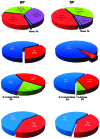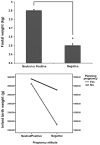Immune system function, stress, exercise and nutrition profile can affect pregnancy outcome: Lessons from a Mediterranean cohort
- PMID: 23404257
- PMCID: PMC3570113
- DOI: 10.3892/etm.2012.849
Immune system function, stress, exercise and nutrition profile can affect pregnancy outcome: Lessons from a Mediterranean cohort
Abstract
Pregnancy is associated with major physiological and future psychosocial changes, and maternal adaptation to these changes is crucial for normal foetal development. Psychological stress in pregnancy predicts an earlier birth and lower birth weight. Pregnancy-specific stress contributes directly to preterm delivery. The importance of nutrition and exercise during pregnancy with regard to pregnancy outcome has long been acknowledged. This importance has only been further emphasized by the recent changes in food quality and availability, lifestyle changes and a new understanding of foetal programming's effects on adult outcomes. We hypothesised that for a successful pregnancy certain events at a nutritional, immune, psycho-emotional and genetic level should be tightly linked. Therefore, in this study we followed an 'integrative' approach to investigate how maternal stress, nutrition, pregnancy planning and exercise influence pregnancy outcome. A key finding of our study is that there was a significant reduction in the intake of alcohol, caffeine-containing and sugary drinks during pregnancy. However, passive smoking in the household remained unchanged. In terms of immune profile, a significant inverse correlation was noted between difficulty to 'fight' an infection and number of colds (r=-0.289, P=0.003) as well as the number of infections (r=-0.446, P<0.0001) during pregnancy. The vast majority of the pregnant women acquired a more sedentary lifestyle in the third trimester. In planned, but not in unplanned, pregnancies stress predicted infant weight, independent of age and body mass index (BMI). Notably, in mothers with negative attitudes towards the pregnancy, those with an unplanned pregnancy gave birth to infants with significantly higher weights than those with planned pregnancies. Collectively these data suggest that there is a higher order of complexity, possibly involving gene-environment interactions that work together to ensure a positive outcome for the mother as well as the foetus.
Keywords: birth weight; maternal stress; smoking.
Figures


Similar articles
-
Offspring body size and metabolic profile - effects of lifestyle intervention in obese pregnant women.Dan Med J. 2014 Jul;61(7):B4893. Dan Med J. 2014. PMID: 25123127 Review.
-
The impact of periconceptional maternal lifestyle on clinical features and biomarkers of placental development and function: a systematic review.Hum Reprod Update. 2019 Jan 1;25(1):72-94. doi: 10.1093/humupd/dmy037. Hum Reprod Update. 2019. PMID: 30407510
-
Psychosocial stress and its relation to obstetrical complications.Psychother Psychosom. 1984;41(4):200-6. doi: 10.1159/000287810. Psychother Psychosom. 1984. PMID: 6463187
-
The effect of weight management interventions that include a diet component on weight-related outcomes in pregnant and postpartum women: a systematic review protocol.JBI Database System Rev Implement Rep. 2015 Jan;13(1):88-98. doi: 10.11124/jbisrir-2015-1812. JBI Database System Rev Implement Rep. 2015. PMID: 26447010
-
Effects on birth weight of smoking, alcohol, caffeine, socioeconomic factors, and psychosocial stress.BMJ. 1989 Mar 25;298(6676):795-801. doi: 10.1136/bmj.298.6676.795. BMJ. 1989. PMID: 2496859 Free PMC article.
Cited by
-
Enablers and barriers to physical activity in overweight and obese pregnant women: an analysis informed by the theoretical domains framework and COM-B model.BMC Pregnancy Childbirth. 2018 May 21;18(1):178. doi: 10.1186/s12884-018-1816-z. BMC Pregnancy Childbirth. 2018. PMID: 29783933 Free PMC article.
-
Physical Activity Volumes during Pregnancy: A Systematic Review and Meta-Analysis of Observational Studies Assessing the Association with Infant's Birth Weight.AJP Rep. 2016 Apr;6(2):e170-97. doi: 10.1055/s-0036-1583169. AJP Rep. 2016. PMID: 27127718 Free PMC article.
-
Investigation of Nutritional Behaviors in the First and Second Trimesters in Pregnant Women Referring to Clinics in Hamadan, Iran, in 2013.Glob J Health Sci. 2016 Sep 1;8(9):54473. doi: 10.5539/gjhs.v8n9p261. Glob J Health Sci. 2016. PMID: 27157177 Free PMC article.
-
Obstetric care providers assessing psychosocial risk factors during pregnancy: validation of a short screening tool - the KINDEX Spanish Version.Child Adolesc Psychiatry Ment Health. 2014 Dec 23;8(1):30. doi: 10.1186/s13034-014-0030-7. eCollection 2014. Child Adolesc Psychiatry Ment Health. 2014. PMID: 25670965 Free PMC article.
-
Evaluation of the effect of education on perceived stress of mother candidates for amniocentesis.J Educ Health Promot. 2021 Jul 30;10:267. doi: 10.4103/jehp.jehp_785_20. eCollection 2021. J Educ Health Promot. 2021. PMID: 34485564 Free PMC article.
References
-
- Shapira N. Prenatal nutrition: a critical window of opportunity for mother and child. Womens Health (Lond Engl) 2008;4:639–656. - PubMed
-
- Vujkovic M, Steegers EA, Looman CW, Ocké MC, van der Spek PJ, Steegers-Theunissen RP. The maternal Mediterranean dietary pattern is associated with a reduced risk of spina bifida in the offspring. BJOG. 2009;116:408–415. - PubMed
-
- de Batlle J, Garcia-Aymerich J, Barraza-Villarreal A, Antó JM, Romieu I. Mediterranean diet is associated with reduced asthma and rhinitis in Mexican children. Allergy. 2008;63:1310–1316. - PubMed
-
- Mariscal-Arcas M, Rivas A, Monteagudo C, Granada A, Cerrillo I, Olea-Serrano F. Proposal of a Mediterranean diet index for pregnant women. Br J Nutr. 2009;102:744–749. - PubMed
LinkOut - more resources
Full Text Sources
